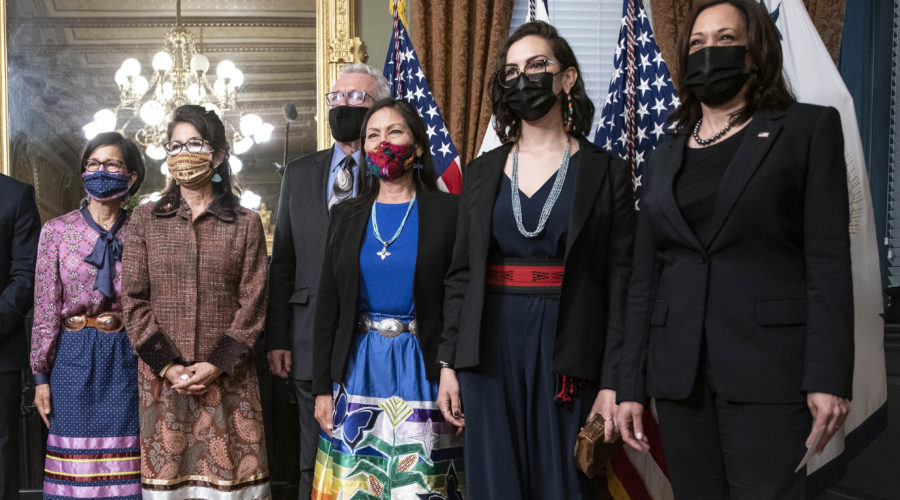
Deb Haaland Makes History as First Native American Cabinet Secretary


Deb Haaland was sworn in Thursday as the 54th head of the U.S. Department of the Interior, making history as the first Native American woman to hold the position of cabinet secretary.
The congresswoman from New Mexico’s ascent is especially noteworthy given the Interior Department’s instrumental role during the 19th and 20th centuries in removing tribes from their lands, a history of oftentimes bloody exploitation Haaland addressed in December when she was nominated.
“This moment is profound when we consider the fact that one former secretary of the Interior once proclaimed his goal, to quote ‘to civilize or exterminate us,'” Haaland said after being nominated, an allusion to an 1851 quote by then-Interior Secretary Alexander H.H. Stuart.
“I am a living testament of the failure of that horrific ideology. I also stand on the shoulders of my ancestors and all the people who sacrificed so that I can be here.”
That gruesome ideology was seldom more evident than when famed Lakota leader Red Cloud, while reflecting on discussions with the U.S. government, said, “They made us many promises, more than I can remember, but they never kept but one; they promised to take our land, and they took it.”
Unlike the anglo settlers who sought to eradicate Native peoples from their home under Stuart’s direction, Haaland’s ancestral ties to the land in New Mexico, where she is a member of the Laguna Pueblo tribe, is extensive—35 generations, in fact.

Sarah Silbiger/Getty Images
Much like her ancestors, Haaland’s path has been a difficult one. As an 8-year-old, Haaland’s grandmother was forcibly removed from their home and sent to Catholic boarding school hundreds of miles away, according to a statement by the Arizona Indigenous People’s Caucus. Later, as a single mother, Haaland endured occasional homelessness, one of myriad issues that have plagued Native communities—a 2014 Pew Research study found that one in four Natives were living in poverty.
These experiences, according to the National Congress of American Indians President Fawn Sharp, make Haaland especially suited for this role.
“The relationship between Tribal Nations and the federal government has been fractured for far too long,” Sharp said in a release. “Having an ally like Secretary Haaland who is not only deeply qualified but is from our communities has the potential to transform the government-to-government relationship and will be vital in advancing Native American issues for generations.”
Near the top of Haaland’s to-do list, meanwhile, is a conservation-focused shift to clean energy, a break from the gas and oil drilling emphasis of past administrations. That anticipated pivot has not come without opposition from some lawmakers who say Haaland’s stance on fossil fuel initiatives, such as the controversial Keystone Pipeline, will eliminate American jobs.
“I have really struggled with this one—how to reconcile a historic nomination with my concerns about the individuals and an administrations conception of what Alaska’s future should be,” Sen. Lisa Murkowski, R-Alaska, said recently. “Representative Haaland, if you’re listening, know that I intend to work with you because I want you to be successful and quite honestly we need you to be successful, but I am also going to hold you to your commitments to ensure that Alaska is allowed to prosper. “
The new Interior secretary responded by expressing optimism that future climate-centric efforts would have bipartisan appeal.
“As I’ve learned in this role, there’s no question that fossil energy does and will continue to play a major role in America for years to come,” Haaland told ABC. “But we must also recognize that the energy industry is innovating, and our climate challenge must be addressed. Together we can work to position our nation and all of its people for success in the future, and I am committed to working cooperatively with all stakeholders, and all of Congress, to strike the right balance going forward.”
Other areas Haaland has spoken openly about balancing are specific to Native communities, notably the disproportionate violence committed against Native women, a horrific trend that prompted the introduction in 2018 of two laws to shine a light on the largely ignored issue.
“Indigenous women have been missing and murdered since Europeans came to this continent in the late 1400s,” Haaland told the Guardian. “Violence against women is a priority of mine. It’s not going to be fixed with just two pieces of legislation, but now it’s time to dig deeper and keep working,”
The opportunity for Haaland to keep working will now come at the helm of a federal organization that controls more than 440 million areas of federal lands.
“At my confirmation hearing, I said that we all have a stake in the future of our country,” Haaland said in a release after being sworn in. “No matter your political party or Zip code, your ancestral heritage or income level, we all must take the formidable challenges that lie ahead seriously, and we will take them head-on, together.”
